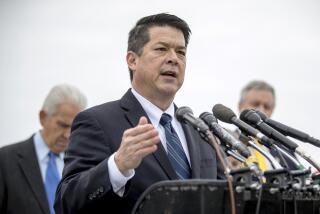Laws to Curb Suits May Have Missed the Mark
A series of federal laws that Rep. Christopher Cox has pushed to stymie frivolous fraud lawsuits against corporations may instead be fostering more litigation.
To lawyers for investors, those laws mark him as a foe of shareholders at a time when he is poised to become the government watchdog of the investment community.
Cox (R-Newport Beach), nominated Thursday by President Bush to head the Securities and Exchange Commission, has been advocating ways to reduce securities litigation for more than a decade.
His biggest effort was his first: the 1995 federal law that severely limited the grounds on which class-action suits could be brought in federal court against corporations.
The Private Securities Litigation Reform Act did not make it impossible to file lawsuits, said Douglas Clark, a securities litigation defense lawyer in Palo Alto. “It took measures to make sure that the lawsuits filed were meritorious. That’s all,” he said.
The law did not stem the tide of class-action suits; it merely shifted the securities litigation battlefield to state courts. Cox helped close that avenue with a 1998 law that preempted states from handling certain lawsuits.
The upshot of such moves is to subject most mass litigation against publicly traded firms to the more stringent federal laws restricting grounds for suits and access to the courtroom.
Part of the idea behind the changes was to save corporations millions of dollars in legal fees and costs in defending against frivolous lawsuits.
The laws, though, have yet to curtail the number of suits being filed, according to statistics from Stanford University Law School’s Securities Class Action Clearinghouse.
In the year the 1995 law passed, 188 securities fraud class-action suits were filed in federal court. That number fell to 110 the next year but steadily marched above 200 by 1998.
A record 493 suits were filed in 2001 as the bubble in the tech industry burst and the frauds at energy trader Enron Corp. and other major companies unraveled. The following year, telecommunications firm WorldCom Inc. collapsed in the nation’s biggest corporate accounting fraud, which reached $11 billion.
The number of federal class-action filings exceeded 200 each of the last three years. Meanwhile, settlement amounts exploded, reaching a record $5.5 billion last year. Partial settlements involving WorldCom alone amounted to $2.6 billion, according to Cornerstone Research, which helps sponsor the Stanford clearinghouse.
The trend toward larger damages will probably continue, reflecting in part the overall growth in the market value of the corporations sued, the research firm said.
But the reasons for the continued growth in class-action filings are less clear, said Michael A. Perino, a professor at St. John’s University School of Law.
The 1995 law emboldened corporate executives to hide bad financial matters and paint a rosier picture than the facts warranted, and that prompted more lawsuits as stock prices dropped, said William S. Lerach of San Diego, one of the foremost securities plaintiffs’ lawyers.
With little government oversight or enforcement, “people ran amok,” said Melvyn I. Weiss of New York, another prominent plaintiffs’ lawyer.
Perino said it was more likely that the law made filing class-action lawsuits less appealing because more of them would get dismissed. So lawyers began filing more lawsuits arising from the same corporate actions.
“The effect of the laws is that the really weak suits we used to see before 1995 have largely been eliminated, and I would count that as a success of the act,” he said.
Cox, a conservative Republican who generally favors business interests, had a personal experience with what he considered a frivolous lawsuit.
In June 1995, Cox was sued by a court-appointed receiver in the bankruptcy of now-defunct First Pension Corp., an Irvine firm. A year later, a new receiver dropped him from the suit.
The suit had accused Cox of deliberately misrepresenting facts about First Pension and its investments while he was a partner at law firm Latham & Watkins. Cox denied the allegations.
First Pension’s founder and other executives were convicted of fraud in a scheme that bilked investors out of $136 million.
More to Read
Inside the business of entertainment
The Wide Shot brings you news, analysis and insights on everything from streaming wars to production — and what it all means for the future.
You may occasionally receive promotional content from the Los Angeles Times.










